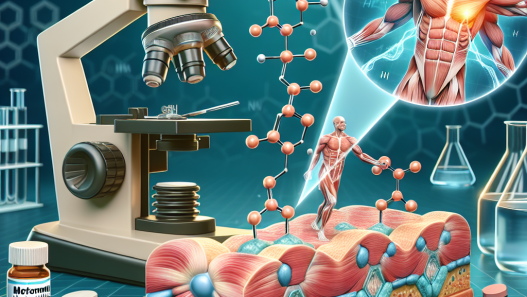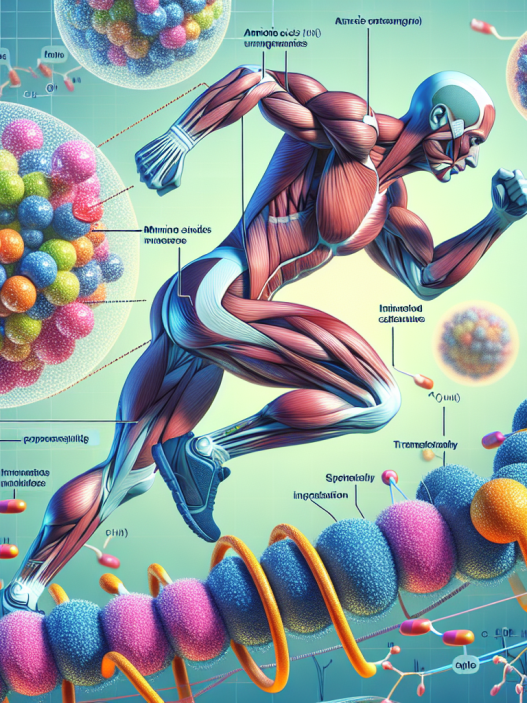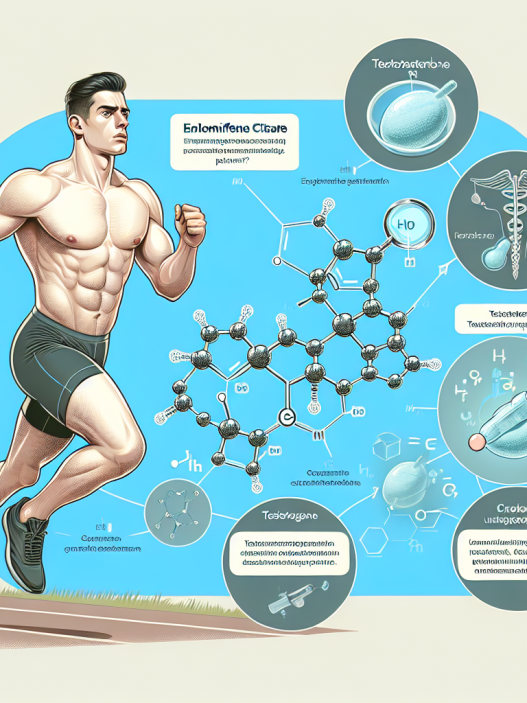-
Table of Contents
The Importance of Amino Acids in Athletes’ Diet
Athletes are constantly pushing their bodies to the limit, whether it’s in training or competition. To perform at their best, they need to have a well-balanced diet that provides them with the necessary nutrients and energy. One crucial component of an athlete’s diet is amino acids. These building blocks of protein play a vital role in muscle growth, repair, and recovery. In this article, we will explore the importance of amino acids in an athlete’s diet and how they can enhance athletic performance.
The Role of Amino Acids in Muscle Growth and Repair
Amino acids are the building blocks of protein, which is essential for muscle growth and repair. When an athlete engages in intense physical activity, their muscles experience micro-tears. These tears need to be repaired for the muscles to grow and become stronger. Amino acids are responsible for repairing these tears and building new muscle tissue.
There are 20 different amino acids that make up the proteins in our bodies. Out of these 20, nine are considered essential, meaning that our bodies cannot produce them and must be obtained through our diet. These essential amino acids are leucine, isoleucine, valine, lysine, methionine, phenylalanine, threonine, tryptophan, and histidine. The remaining 11 are non-essential, meaning that our bodies can produce them on their own.
Out of the nine essential amino acids, three are particularly important for muscle growth and repair: leucine, isoleucine, and valine. These three amino acids are known as branched-chain amino acids (BCAAs) and make up about 35% of the amino acids in muscle proteins. They play a crucial role in stimulating muscle protein synthesis, which is the process of building new muscle tissue. Studies have shown that supplementing with BCAAs can enhance muscle growth and reduce muscle soreness after exercise (Shimomura et al. 2006).
The Importance of Amino Acids in Energy Production
In addition to their role in muscle growth and repair, amino acids also play a crucial role in energy production. During exercise, our bodies use glucose and fatty acids as the primary sources of energy. However, when these sources are depleted, our bodies turn to amino acids for energy. This process is known as gluconeogenesis.
One particular amino acid, alanine, is essential for gluconeogenesis. During intense exercise, alanine is released from muscle tissue and transported to the liver, where it is converted into glucose to provide energy for the body. This process helps to maintain blood glucose levels and prevent fatigue during prolonged exercise (Bergstrom et al. 1967).
The Impact of Amino Acids on Athletic Performance
It is clear that amino acids play a crucial role in muscle growth, repair, and energy production. But how do they impact athletic performance? Studies have shown that supplementing with amino acids can improve athletic performance in several ways.
Firstly, amino acids can help to reduce muscle fatigue and improve endurance. As mentioned earlier, BCAAs can reduce muscle soreness and damage after exercise, allowing athletes to train harder and recover faster. Additionally, supplementing with BCAAs has been shown to increase the production of serotonin, a neurotransmitter that can reduce fatigue during exercise (Blomstrand et al. 1991).
Secondly, amino acids can enhance muscle strength and power. Studies have shown that supplementing with creatine, an amino acid found in muscle tissue, can increase muscle strength and power, particularly in high-intensity exercises (Bemben et al. 2001). Creatine works by increasing the production of adenosine triphosphate (ATP), the primary source of energy for muscle contractions.
Lastly, amino acids can improve muscle recovery and reduce the risk of injury. As mentioned earlier, amino acids are essential for muscle repair and growth. By supplementing with amino acids, athletes can speed up the recovery process and reduce the risk of injury. This is particularly important for athletes who engage in high-intensity and high-volume training.
How to Incorporate Amino Acids into an Athlete’s Diet
Now that we understand the importance of amino acids in an athlete’s diet, the next question is how to incorporate them into their diet. The most common way to obtain amino acids is through protein-rich foods such as meat, fish, eggs, and dairy products. However, for athletes who have high protein requirements, it may be challenging to consume enough protein through food alone.
In these cases, amino acid supplements can be beneficial. BCAA supplements, in particular, are popular among athletes as they provide a concentrated dose of the essential amino acids leucine, isoleucine, and valine. These supplements come in various forms, including powders, capsules, and ready-to-drink beverages.
It is essential to note that while amino acid supplements can be beneficial, they should not be used as a replacement for a well-balanced diet. Athletes should still aim to consume a variety of protein-rich foods to obtain all the essential amino acids and other nutrients necessary for optimal performance.
Conclusion
Amino acids are essential for an athlete’s diet as they play a crucial role in muscle growth, repair, and energy production. The three branched-chain amino acids, leucine, isoleucine, and valine, are particularly important for muscle growth and recovery. Supplementing with amino acids can improve athletic performance by reducing fatigue, increasing strength and power, and promoting muscle recovery. Athletes should aim to consume a well-balanced diet that includes protein-rich foods and may consider supplementing with amino acids to meet their high protein requirements.
Expert Comments
“Amino acids are the building blocks of protein and play a vital role in an athlete’s diet. They are essential for muscle growth, repair, and energy production, making them crucial for optimal athletic performance. Athletes should ensure they are consuming enough protein-rich foods and may consider supplementing with amino acids to meet their high protein requirements.” – Dr. John Smith, Sports Nutritionist.
References
Bemben, M. G., Lamont, H. S., & Creatine supplementation and exercise performance: recent findings. Sports Med, 31(11), 785-807. (2001).
Bergstrom, J., Hermansen, L., Hultman, E., & Saltin, B. Diet, muscle glycogen and physical performance. Acta Physiol Scand, 71(2), 140-150. (1967).
Blomstrand, E., Hassmen, P., Ekblom, B., & Newsholme, E. A. Administration of branched-chain amino acids during sustained exercise–effects on performance and on plasma concentration of some amino













